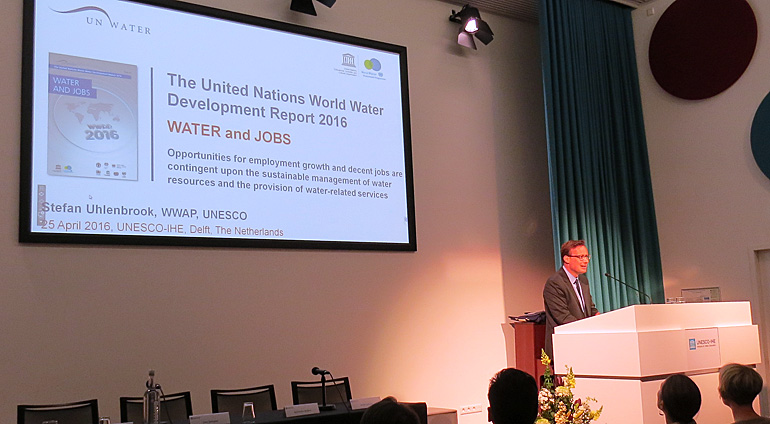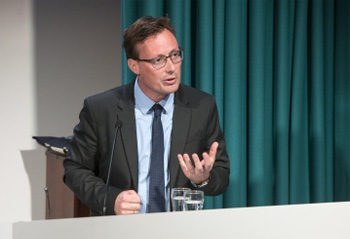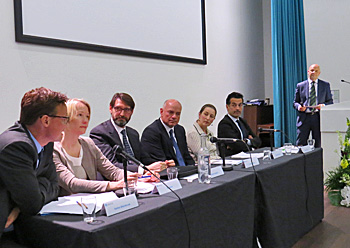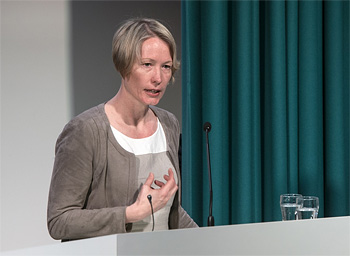And the good news is: water scarcity has the potential of a job creator
 The water sector can make a major contribution to the global transition to a low-carbon, circular and sustainable economy. It should not put water resources at risk and simply produce more if demand increases.
The water sector can make a major contribution to the global transition to a low-carbon, circular and sustainable economy. It should not put water resources at risk and simply produce more if demand increases.
There are more sophisticated ways to meet the expected increase of global water demand. The good news is that these new ways create also more high qualified jobs.
That was the take-away message of the regional launch of the UN World water development report at Unesco-IHE water institute in Delft, the Netherlands, on 25 April.
This year's theme of World Water Day was 'water and jobs' and a special report was published on the development of jobs, both within the water sector itself as well as within sectors that heavily depend on water like agriculture, fishery, energy and industry.
During the regional launch of the WWDR-report at Unesco-IHE a panel of experts discussed the business perspective of water-related jobs.
 Stefan Uhlenbrook, co-author of UN's WWDR-report on water and jobs.
Stefan Uhlenbrook, co-author of UN's WWDR-report on water and jobs.
Water as job creator
The global working force is estimated at 3,2 billion people. Only 1 percent is at work within the water sector and 42 percent in a heavily water using sector. This means that 1.4 billion jobs in the world heavily depend on the availability of fresh water. "The report clearly shows that the growing water scarcity limits economic growth", said coordinator Stefan Uhlenbrook of the UN World Water Assessment Programme (WWAP) that is responsible for the annual thematic UN report.
“We shall need to store more water, more rainwater harvesting and clever designed multifunctional dams that can also produce hydropower. This will create many new high qualified jobs", he predicted on the occasion of the regional launch.
He emphasized that water not only creates jobs within the water sector, but also enables new jobs outside the water sector. "A new water treatment plant not only provides direct jobs for water professionals but it also induces new jobs in other sectors such as construction, financing, industrial services."
 The full panel that debated the business perspective of the global water challenges, including (fltr) Stefan Uhlenbrook, Uta Wehn, Didier Gambier/EU, John Verbakel/Unilever, Ardi Stollosbraken/Dutch ministery and Xavier Leflaive/OECD. Panel leader (right) was Unesco-IHE business director Aad van Dijk.
The full panel that debated the business perspective of the global water challenges, including (fltr) Stefan Uhlenbrook, Uta Wehn, Didier Gambier/EU, John Verbakel/Unilever, Ardi Stollosbraken/Dutch ministery and Xavier Leflaive/OECD. Panel leader (right) was Unesco-IHE business director Aad van Dijk.
Green jobs
Uhlenbrook regarded water as a fundamental driver of green growth. As an example he mentioned renewable energy sources, like solar and wind. "These sources are far less water dependable than coal-fired or nuclear power plants that need large amounts of cooling water."
According to Uhlenbrook renewable energy sources like solar and wind, create also many more new jobs and go well hand-in-hand with a more sustainable use of water resources.
This raised a discussion on the need for the water sector to go outside the box and talk to their water peers in the energy sector.
Potential of smart hydropower
Uhlenbrook mentioned the potential of hydropower and the negative attitude within the water sector. "Hydropower is an important resource for the realisation of the Paris climate agreement. Hydrologists can help the energy sector to design smart dams and reservoirs, allowing to achieve multiple goals".
As an example he mentioned the use of water reservoirs as a battery to meet peak energy demands. "By pumping the water uphill the water level can be raised at times of a low energy demand and the water can be released when there is a peak demand."
 Professor Uta Wehn addressed the outcomes of the recent WWDC-report from the perspective of capacity building and water education institutes like Unesco-IHE.
Professor Uta Wehn addressed the outcomes of the recent WWDC-report from the perspective of capacity building and water education institutes like Unesco-IHE.
Winners and losers
Xavier Leflaive, water team leader at the Organisation for Economic Cooperation and Development (OECD) touched upon another good reason to look at water from an economic perspective. "For countries that heavily depend on transboundary rivers, like Egypt and Tajikistan it enables to understand the economic gains and losses of water scarcity. It is too simple to allocate scare water resources to the user with the most economic value. Farmers need the water too", Leflaive said.
"By looking at water from an economy angle, it is possible to identify the winners and losers of water scarcity. This enables to compensate the losers. It can help the political dialogue and improve cooperation in a river basin."
Shortage of water professionals
Associate professor Uta Wehn of Unesco-IHE highlighted the report's call for many highly skilled water professionals that will be needed to man these new jobs. "Over the years our institute has delivered 15.000 water professionals, whereas it has been predicted that some 700,000 are needed to meet the future water needs", she said to show the magnitude of training issue.
"Most water professionals learn from experiences, so training is not enough", she added. "Therefore as Unesco-IHE we are creating partnerships with the local water operators to enable capacity building in practice. This sticks better".
Download the full WWDR-report on water and jobs (pdf-file, 19mB).
A report has been puiblished on the website of Unesco-IHE.
Read also on this website
● Unesco-IHE institute for water education celebrates World Water Day, 22 March 2016
● AfriAlliance to strengthen link between Africa and Europe on water and climate, 13 January 2016
● World Water Day 2016: Availability and management of water links to quality jobs, 21 March 2016
More information
UN World Water Assessment Programme
Perugia,Italy
+39 075 59 11 01
www.unesco.org/wwap
Unesco-IHE
Delft, the Netherlands
+31 15 212 29 21
www.unesco-ihe.org
The event was live-streamed. Click here to view the video.



